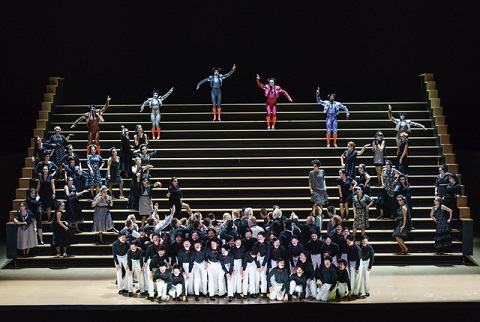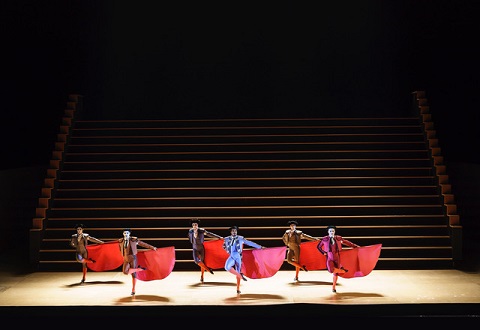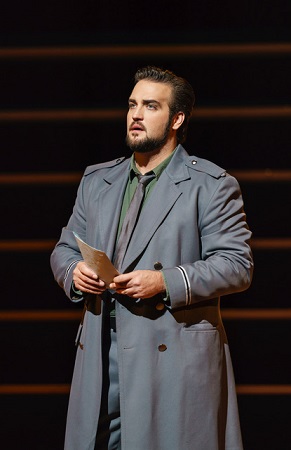
04 Dec 2018
First revival of Barrie Kosky's Carmen at the ROH
Charles Gounod famously said that if you took the Spanish airs out of Carmen “there remains nothing to Bizet’s credit but the sauce that masks the fish”.
English Touring Opera are delighted to announce a season of lyric monodramas to tour nationally from October to December. The season features music for solo singer and piano by Argento, Britten, Tippett and Shostakovich with a bold and inventive approach to making opera during social distancing.
This tenth of ten Live from London concerts was in fact a recorded live performance from California. It was no less enjoyable for that, and it was also uplifting to learn that this wasn’t in fact the ‘last’ LfL event that we will be able to enjoy, courtesy of VOCES8 and their fellow vocal ensembles (more below …).
Ever since Wigmore Hall announced their superb series of autumn concerts, all streamed live and available free of charge, I’d been looking forward to this song recital by Ian Bostridge and Imogen Cooper.
The Sixteen continues its exploration of Henry Purcell’s Welcome Songs for Charles II. As with Robert King’s pioneering Purcell series begun over thirty years ago for Hyperion, Harry Christophers is recording two Welcome Songs per disc.
Although Stile Antico’s programme article for their Live from London recital introduced their selection from the many treasures of the English Renaissance in the context of the theological debates and upheavals of the Tudor and Elizabethan years, their performance was more evocative of private chamber music than of public liturgy.
In February this year, Albanian soprano Ermonela Jaho made a highly lauded debut recital at Wigmore Hall - a concert which both celebrated Opera Rara’s 50th anniversary and honoured the career of the Italian soprano Rosina Storchio (1872-1945), the star of verismo who created the title roles in Leoncavallo’s La bohème and Zazà, Mascagni’s Lodoletta and Puccini’s Madama Butterfly.
Evidently, face masks don’t stifle appreciative “Bravo!”s. And, reducing audience numbers doesn’t lower the volume of such acclamations. For, the audience at Wigmore Hall gave soprano Elizabeth Llewellyn and pianist Simon Lepper a greatly deserved warm reception and hearty response following this lunchtime recital of late-Romantic song.
Collapsology. Or, perhaps we should use the French word ‘Collapsologie’ because this is a transdisciplinary idea pretty much advocated by a series of French theorists - and apparently, mostly French theorists. It in essence focuses on the imminent collapse of modern society and all its layers - a series of escalating crises on a global scale: environmental, economic, geopolitical, governmental; the list is extensive.
For this week’s Live from London vocal recital we moved from the home of VOCES8, St Anne and St Agnes in the City of London, to Kings Place, where The Sixteen - who have been associate artists at the venue for some time - presented a programme of music and words bound together by the theme of ‘reflection’.
'Such is your divine Disposation that both you excellently understand, and royally entertaine the Exercise of Musicke.’
Amongst an avalanche of new Mahler recordings appearing at the moment (Das Lied von der Erde seems to be the most favoured, with three) this 1991 Mahler Second from the 2nd Kassel MahlerFest is one of the more interesting releases.
‘And there was war in heaven: Michael and his angels fought against the dragon; and the dragon fought and his angels, And prevailed not; neither was their place found any more in heaven … that old serpent … Satan, which deceiveth the whole world: he was cast out into the earth, and his angels were cast out with him.’
If there is one myth, it seems believed by some people today, that probably needs shattering it is that post-war recordings or performances of Wagner operas were always of exceptional quality. This 1949 Hamburg Tristan und Isolde is one of those recordings - though quite who is to blame for its many problems takes quite some unearthing.
There was never any doubt that the fifth of the twelve Met Stars Live in Concert broadcasts was going to be a palpably intense and vivid event, as well as a musically stunning and theatrically enervating experience.
‘Love’ was the theme for this Live from London performance by Apollo5. Given the complexity and diversity of that human emotion, and Apollo5’s reputation for versatility and diverse repertoire, ranging from Renaissance choral music to jazz, from contemporary classical works to popular song, it was no surprise that their programme spanned 500 years and several musical styles.
The Academy of St Martin in the Fields have titled their autumn series of eight concerts - which are taking place at 5pm and 7.30pm on two Saturdays each month at their home venue in Trafalgar Square, and being filmed for streaming the following Thursday - ‘re:connect’.
The London Symphony Orchestra opened their Autumn 2020 season with a homage to Oliver Knussen, who died at the age of 66 in July 2018. The programme traced a national musical lineage through the twentieth century, from Britten to Knussen, on to Mark-Anthony Turnage, and entwining the LSO and Rattle too.
With the Live from London digital vocal festival entering the second half of the series, the festival’s host, VOCES8, returned to their home at St Annes and St Agnes in the City of London to present a sequence of ‘Choral Dances’ - vocal music inspired by dance, embracing diverse genres from the Renaissance madrigal to swing jazz.
Just a few unison string wriggles from the opening of Mozart’s overture to Le nozze di Figaro are enough to make any opera-lover perch on the edge of their seat, in excited anticipation of the drama in music to come, so there could be no other curtain-raiser for this Gala Concert at the Royal Opera House, the latest instalment from ‘their House’ to ‘our houses’.
"Before the ending of the day, creator of all things, we pray that, with your accustomed mercy, you may watch over us."

Charles Gounod famously said that if you took the Spanish airs out of Carmen “there remains nothing to Bizet’s credit but the sauce that masks the fish”.
This first revival - perhaps it should be the last - of Barrie Kosky’s Frankfurt Carmen rather reminded me of Gounod, though in a different way. What happens, for example, when you take almost the entire plot out of the opera and you’re left with just the music to hold it together? What if you don’t really bother staging it at all? And what if you have the temerity to think one of the great Nineteenth Century operas needs a little bit of improving here and there?
In a sense it’s obvious where Kosky is going with his Carmen, and it’s equally obvious he is stripping away decades of production history to get there. But Bizet is not Kurt Weill - and this is not Weimar Germany with its hedonism and liberated sexual identities (which I’ll come to later). Kosky, too, embraces the theatre to such an extent that you sometimes forget entirely you’re watching opera. The shadow of Bertolt Brecht looms so heavily over this production it’s not in the remotest a subtle gesture: Brecht’s concept of theatre was all about fragmenting it, turning it into incoherence by disrupting the balance of it, and Kosky does the same. This happens immediately after the Act I prelude - and is a constant source of invasion throughout the opera - where Kosky replaces Bizet’s original dialogue and recitative with a spoken narrative. It’s almost irrelevant who the narrator is - it could be Carmen, but it might not be - it’s the form of the narration which is a huge problem. Part-Bizet, part-Mérimée, too often it just sounds like stage directions - and it stalls the momentum of opera fatally.
Given the allusions to the period, and to the genre, Kosky’s production is oddly not particularly decadent - in fact, I often felt it came with a health warning. There’s not a cigarette in sight, and yet the references to Dietrich in Blonde Venus are unmistakable. Josef von Sternberg’s The Blue Angel, with its themes of cabaret, sexual jealousy and madness seems startling prophetic as a recurring metaphor throughout Kosky’s staging - even down to such small details as Carmen’s top hat - but it also seems codified in incompletion. Kosky might have gone further, but he doesn’t. You can see parallels between Dietrich’s Lola and Kosky’s Carmen - not least in the concept of sexual corruption - but you really want this to be explored more, especially when this is all you have to rely on for dramatic context.
To the extent that Kosky places the opera in a more liberal sexual age might actually be the most progressive thing about his production. It is not Carmen’s hands that are bound, as the libretto suggests, but in Kosky’s staging a visual depiction that comes closer to shibari. There is a homoflexibility to the dances, with shirtless males dancing flamenco or tangos - entirely in keeping with the 1920s. But whether these theatrical, balletic concepts deflect from the fundamental operatic basis of Carmen remains questionable. The pastiche of whitened faces seemed just as close to kabuki as it did to the Brechtian construct of theatre being used for political statement. You could take it either way.
The staging itself is entirely constant - a huge pyramidic staircase that takes up the entire stage. To suggest this is awkward is an understatement - from a purely visual point of view it shape-shifts so often you often feel you’re hallucinating. Only once does it seem to be used for any startling dramatic effect and that is when Carmen’s huge wedding train is fanned out like a crêpe scallop behind her on the steps - an image that almost recalls Botticelli’s Birth of Venus. Otherwise, it is simply a means to an end - a staircase for a cabaret show, the arena of a bullring, the amphitheatre for an audience.
 Photo credit: Bill Cooper.
Photo credit: Bill Cooper.
The cynic might argue that Kosky’s production gravitates towards the theatrical because Michael Rot’s edition of Carmen, which restores many of the cuts Bizet made, makes this hard to bring off as pure opera. You get two Habanera for the price of one, the extended version of Don José’s Dragon d’Alcala and a marginally altered ending. Not withstanding the insertion of spoken narration at the expense of the recitatives, the evening dragged. I don’t think hearing music that was fundamentally new to most listeners was a significant issue but the extensive interruption that the spoken dialogue caused - no matter how evocatively, even smokily, it was phrased by Claude de Demo - was problematic. You often felt the orchestra were playing in extended paragraphs, and where there should have been a feeling that every note of the music was embracing Bizet’s love of melody and intensity you were left with the impression you were being drawn into Brecht’s theatre of distanciation.
I’m in two minds about the quality of the singing in this production. It’s certainly true that the demanding choreography and the stamina required of the singers in this staging is unusual for Carmen (or, indeed, would be in any opera outside Wagner). I think this was especially the case for the Carmen, sung by the French mezzo-soprano Gaëlle Arquez, who replaced Ksenia Dudnikova at quite short notice. She did have the advantage of having sung the role during part of last season’s first run of this production, but nevertheless it must have been daunting given the complexity she faced. If choreographically her performance was tight, even accomplished, her voice sometimes seemed to come under strain. But, it’s always a bonus to hear a French mezzo sing Carmen and the warmth of her phrasing doesn’t hide the sexuality - or, her own brand of it - that she brings to the part. This is, however, quite like the distinctive kind of sexuality that Dietrich brought to the screen: distant, fateful, enigmatic, perhaps even a little asexual. She is just the right side of convincingly dangerous, though there is little chemistry between her and Don José or any other man she encounters.
 Brian Jadge as Don José. Photo credit: Bill Cooper.
Brian Jadge as Don José. Photo credit: Bill Cooper.
Brian Jagde as Don José often seemed unforgettable; except when you see him he looks almost dream casting. He’s an imposing stage presence, but I didn’t find the voice compelling, his tone a little too bright rather than dramatic. Alexander Vinogradov’s Escamillo was rather the opposite. Russian basses seem rather in vogue for this role these days, and the resonance and richness of his voice was perhaps the best thing all evening in a largely unevenly sung production. His ‘Votre toast, je peux vous le rendre’ had considerable swagger. Eleonora Buratto as Micaëla, a little too fragile for my taste, was secure enough but seemed to come and go like smoke vapour (had there been any, of course).
The Canadian conductor, Keri-Lynn Wilson, seemed to get things off to a flying start - quite literally - during the opening prelude when her baton landed somewhere in the orchestra stalls (and, yes, it seems conductors do have a spare one to hand) but by-and-large I think what she wanted to achieve with Bizet’s score was hampered by both Rot’s edition and the fragmentation imposed on it. Should Covent Garden wish to give us a traditional staging of Carmen it might seem reasonable to invite her back to conduct it because when the music had some pace she drove it forward like a charging bull. It’s evident she knows how to make an orchestra phrase (and this score is full of opportunities to do that) and it’s clear she can get the orchestra to play well.
Some will find Barrie Kosky’s Carmen inventive and imaginative because it dares to offer a new perspective on this opera. The question I asked myself after I left Covent Garden after the opening night wasn’t so much what it all meant, but rather why I had found the whole production such an effort to sit through. I’m certainly not immune to directors subverting opera into something post-modernist or expressionist, or challenging assumptions about the art form into something entirely new and different, but Kosky somewhat lost me when he turned Bizet’s Carmen into a clunky tableau of theatrical - and operatic - sketches with nothing discernible to give it dramatic impact.
And, never have I felt less guilty about smoking a cigarette after a performance of Carmen than after this particular production.
Marc Bridle
Bizet: Carmen
Gaëlle Arquez - Carmen, Brian Jagde - Don José, Alexander Vinogradov - Escamillo, Eleanoro Buratto - Micaëla, Dominic Sedgewick - Moralès, Haegee Lee - Frasquita, Germán E Alcántara - Dancaïro, Claude de Demo - Voice of Carmen, soldiers, children, cigarette girls, gypsies, smugglers; Barrie Kosky - Director, Alan Barnes - Revival Director, Katrin Lea Tag - Designer, Joachim Klein - Lighting, Royal Opera Chorus, Royal Opera House Orchestra/Keri-Lynn Wilson - conductor, Chorus and Dancers, Streatham & Clapham High School Choir, Tiffin Boys’ Choir.
Royal Opera House, Covent Garden; 30th November 2018.